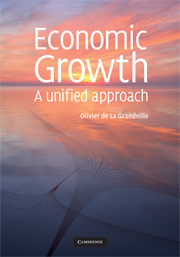In conclusion: on the convergence of ideas and values through civilizations
Published online by Cambridge University Press: 01 February 2010
Summary
In the last chapter, we have shown how a conjecture of tremendous import for the future of our societies, namely Ibn Khaldun's and Adam Smith's idea that our well-being is driven by competitive equilibrium, is vindicated today by economic theory.
Their conjecture came from two different worlds, four centuries apart. Nevertheless, their works were linked in more ways than one. William Letwin had these words to conclude his “Introduction” to Adam Smith's magnum opus: “Far from being a hymn in praise of anarchic greed, the Wealth of Nations is a reasoned argument for justice, order, liberty and prudent plenty”. It would certainly be difficult to find a better way to characterize the Muquaddimah by Ibn Khaldun.
We can pursue the examples of the convergence of ideas and values among civilizations on the normative level. Remember how Ibn Khaldun had relied on the Tâhir b.al-Husayn letter, written in 821, to define what in his mind was the optimal form of government, and how its responsibilities were to be defined. It turns out that Tâhir's letter found an exact echo four centuries later, in Thomas Aquinas' letter to Hugues II, King of Cyprus (De Regno ad Regem Cypri, 1265). We will never know if Thomas Aquinas had known of Tâhir's letter. It is most likely that he had not. This convergence toward a common political and social ethic is then nothing short of remarkable.
Some of the most cherished values of Western civilization were independently formulated in the ancient chinese philosophical writings of Mo Tzu (later half of the fifth century BC). Mo Tzu spent a good part of his life trying to advocate the principle of defensive wars, and condemning offensive warfare.
- Type
- Chapter
- Information
- Economic GrowthA Unified Approach, pp. 349 - 350Publisher: Cambridge University PressPrint publication year: 2009



